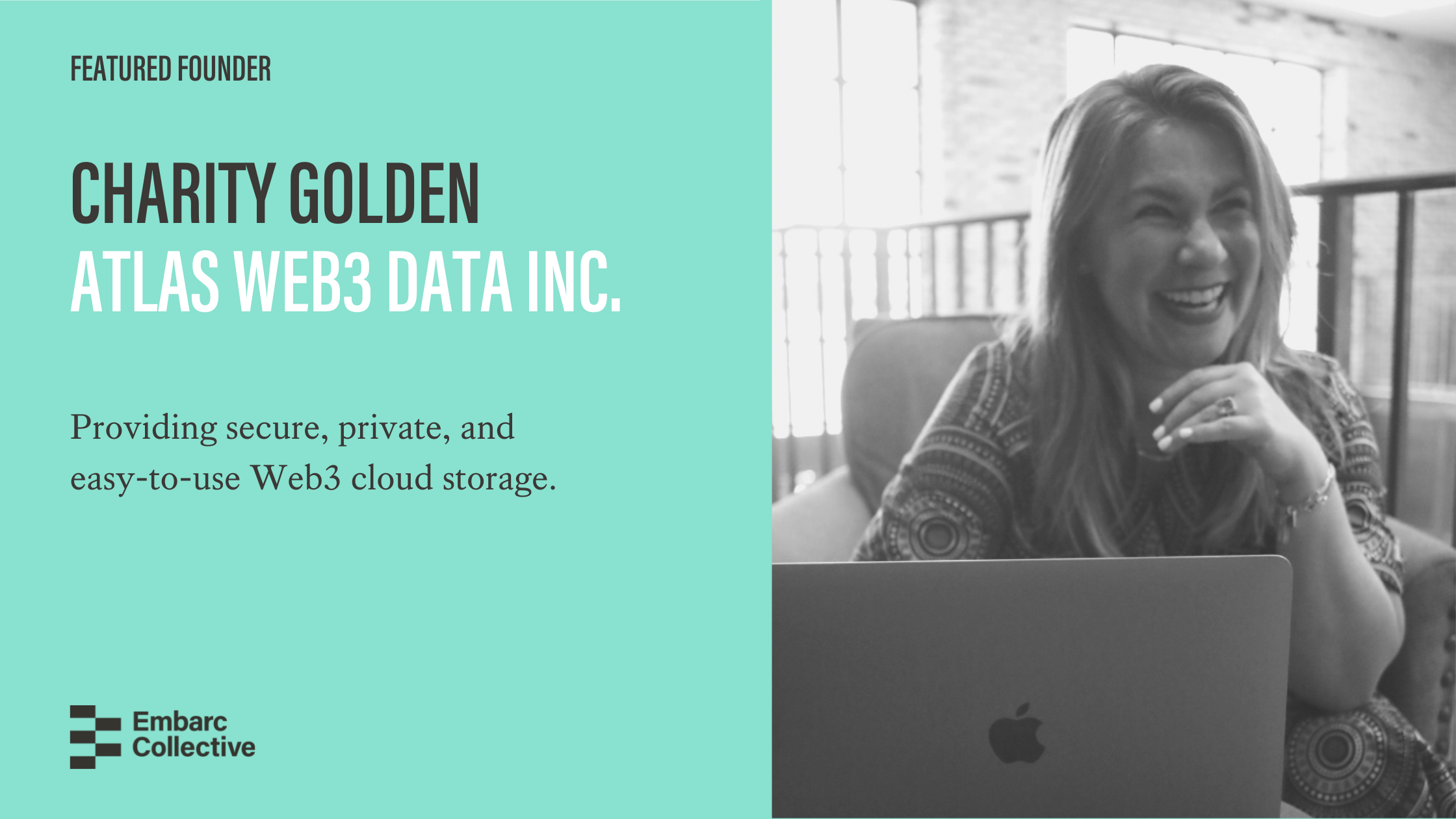
Featured Founder: Charity Golden of Atlas Web3 Data Inc.
8 min read · Jan 31

Get the Weekly Collective
Learn about upcoming events and the latest startup news—delivered to your inbox weekly.
About The Author
Embarc Collective
Welcome to our Featured Founder series, where you’ll meet startup founders from Tampa-St. Petersburg who are building and scaling their ventures to solve some of the world’s greatest challenges. We interviewed Charity Golden of Atlas Web3 Data Inc., a startup providing secure, private, and easy-to-use Web3 cloud storage.
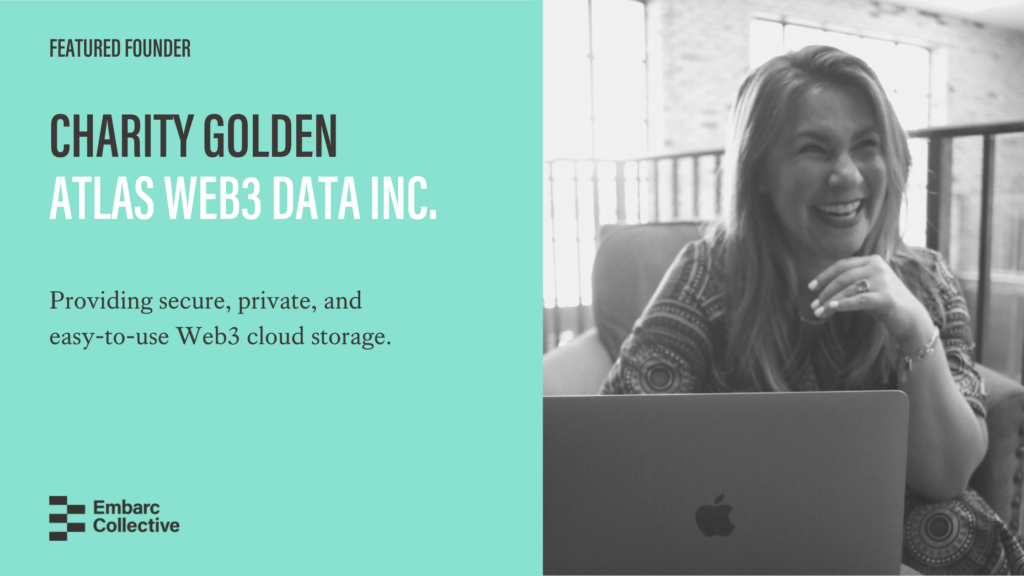
What were you doing previously and what inspired you to launch your company?
I have been a global growth strategist since business school. I did some consulting, I was in venture capital, [and] I was a Chief Experience Officer for a tech company in New York. I love to see and help people grow. They know where they’re at, and they know where they want to be, but to help them get there is really, really cool. I want to be a part of that.
Sometimes people doubt themselves – they don’t know how to get access to things. To be alongside them in their journey, improve their metrics, and maybe iron out some personnel issues or advocate for yourself is really cool.
I’m the cofounder of [Atlas Web3 Data Inc.] with my husband, Peter Golden. [Atlas] really was a confluence of our talents. He had an idea to build A-Lock, the B2C product that Atlas is launching at Synapse publicly. It is a private cloud storage company. A-Lock is the first B2C private cloud storage company accessible to the B2C market. So you don’t need a [computer science] degree, you don’t need to be a developer to access it – it’s going to be very, very simple.
We have two little girls, and we wanted to protect their privacy. I have beautiful photos of them in the tub (just when they were wee babes) and birthing videos, and my husband and I really saw an opportunity to protect those memories and protect some of those precious moments. And we kind of put our heads together.
[My husband] has a coding background – he was Duke [computer science], electrical engineering, and computer engineering (so, you know, a slacker). He worked as a nuclear submarine officer, so he saw the kind of “classified” side of things. And then he moved into anti-money laundering, both as a consultant and then for a bank.
So he really saw how government and business were taking our personal data – our private data – and monetizing that. So we just thought, “Hey, what a wonderful opportunity to provide a layer of protection for people that said, ‘Hey, listen, this is really precious.’”
Maybe it’s a diagnosis. Maybe it’s your financial returns. There are all sort of nefarious actors out there trying to hack things, and unfortunately we have friends who have [had a phone hacked]. I have a mom friend – a single mom friend, a business owner – [and] her phone got hacked. And the people who hacked it actually applied for PPP loans. You know, that kind of silly, terrible stuff. We really just saw an opportunity to encrypt, dissect, and distribute personal data in a way that just hadn’t been done before.
What pain point is your company solving? What gets you excited to go to work every day?
Really, it’s just back to that choice. That people don’t have to accept what the market has out there with big companies – what Apple, Google, AWS say: “Trust us, we’ll protect you.” People can really reclaim their right to privacy and say, “Hey, I’m no longer going to surrender my right to privacy on the altar of your technological convenience.” It’s really saying, “Hey, these are precious moments that I’d like to protect. This is a diagnosis that I’d like to protect.”
Our slogan at A-Lock is, “Protect what’s yours.” Whatever that is, it’s coming alongside and giving people real opportunity.
So the pain point [we’re solving] is giving people a choice – I guess [it’s] an underdog choice, I guess [it’s] the “American dream” choice. I guess [it’s] two parents wanting to protect their little kids, coming up with an idea, and then building it with amazing collaborators and saying, “Hey, this is an alternative for you, and we really want you to consider it and have a go at it.”
And you know, [it’s] proving to people that you can have privacy without a company looking into your data. So A-Lock never actually has a copy of that original picture. Apple, Google, [and] AWS always have an original for their employees to look at (or not look at, God willing), but we at A-Lock never see that because the devices for each user – it’s encrypted on that device. So A-Lock never gets any of that from the get-go.
Name the biggest challenge you faced in the process of launching the company. How did you overcome it?
This [question] is real for us, because we were at Synapse last year and we had no app. Our biggest problem is proving to people that they need this. I know we’re not the iPhone (yet), but until Steve Jobs stood on that stage and said, “Here’s the iPhone – you’ll never need anything else in your life,” no one really knew that they needed or could use an iPhone.
For us, [the challenge is] saying and marketing ourselves in a way that says, “Hey, listen: take back your privacy. You can be in charge of that. Let me empower you, let me give you [back] ownership [of] your own memories, financial details, budgeting, college savings details, plan, or debt.”
Whatever it is, let me empower you to say, “Thank you for Google Maps, but that doesn’t mean that Google gets to see my child’s birthing video or their first recital playing the piano – to then later have an algorithm push me stuff to buy piano stuff.”
It’s just this saying, “Hey, you guys deserve to have a little protection and a little privacy from the world out there.” Not that they’re doing bad things (and, God willing, that doesn’t happen!), but mind your business. I don’t need to know your dating profile. No one does!
We’re overcoming [these problems] by actually building [a solution]. We decided to bootstrap this and build a product that we could show people. It’s not an idea. This right to privacy that’s empowering and uplifting and positive is an option.
We’ve built it, and we’re launching it, and we’re literally going to push it to people and say, “Hey, use this. If it fixes your problems, or if it stores everything you need to – [does] everything the cloud does – and also protects your privacy, choose us!”
So we’re putting our money where our mouth is. My mom always says, “Proof’s in the pudding.” So we’re putting the proof in the pudding and saying, “This is an alternative for you. We are transparent. Please pay us money based on the storage.”
We’re not trying to back in and get money through marketing and [whatever]. If you want a terabyte of privacy, true privacy – we’re defining that as true, transparent privacy – please pay us X amount of dollars. There’s no back end.
Where do you see your company headed next?
Hopefully mass adoption. I would really, really like to change the conversation. These bigger companies, they say, “Hey, you know, we respect your privacy…” But do they really? I would just really encourage people to claim that back.
We really would love to continue to grow. We have some advisors, we just brought on our first equity partner, and that’s going really well. So we want to grow intentionally while in line with our values.
We’re not just interested in taking money from whomever. That’s why we’re bootstrapping this. Peter works a full time job. I have my own practice to pay for this. Because we really want to partner with people who have our vision that’s really uplifting and positive and powerful.
I guess that’s the hope for the next year: work out any of the bugs that might pop out and continue to improve our worth. We want to prove our value proposition, which is true privacy – [and] for the people that trust us to use it.
Give us a tactical piece of advice that you’d share with another founder just starting out.
This is kind of a life mantra: “Don’t be in a rush to get it wrong.” For me, that means: don’t just take money from whomever. Take your time planning it out.
But also: “Don’t let fear stop you.” Do it scared. Get feedback. Get your trusted people. Get three to five people around you who think a little differently than you. Yes, men and women around you – [but] do not get into the hole of groupthink.
You want people to come from different industries, older than you, younger than you – really, that diversity of perspective when you’re building a company is really crucial.
Because when you have that diversity of thought, of industry background, of undergraduate, of global origin or point of origin, you really get this – I don’t want to say foolproof, but you get this holistic perspective on what you’re trying to build and can put into the world, which you hope is good and is going to add value. And when you have those trusted people, those diverse thinkers around you, it’s really going to make it even more robust.
Why Tampa Bay?
I’m a Plant City girl. I grew up in Hillsborough County, my family’s from Plant City – winter strawberry capital of the world. My uncle’s a strawberry farmer, and my grandparents still own that land off of McIntosh Road.
Plant City, Tampa – they’re my roots. I was [on] special assignment at Armwood High School, and cheered there, and graduated [from] there, and went off to New York. I was gone for 15 years and lived in New York, Spain, Bulgaria, and Singapore… [and] picked up my husband along the way. But this is home. These are where my roots are. And when you’re raising children, you want them to have good, solid roots in a place that is curious and forward thinking.
I’ve been really grateful to see the growth and maturation of Tampa as a forward-thinking place and space here in the Southeast. I want to commend Embarc Collective and its colleagues down in Miami and what they’re building [in] this startup space: bringing innovation and bringing talent back to that global, diverse thinking – that’s really important to me.
And the food’s gotten better. I love food, and I’ve lived and traveled all over the world. So having all different kinds of amazing food – I’ve been really proud of Tampa for that. And having an international airport has been really helpful so that we can bugger off to different places and spaces around the world.
Tampa’s home, it’s where my roots are, and I like to say [that] you have good roots so you can sprout wings, and fly, and explore… and bring the good stuff back. And that’s just the cycle of life. My roots are in Plant City, and then I went off to New York, got some of the good stuff, [and brought] that back.
Related Articles
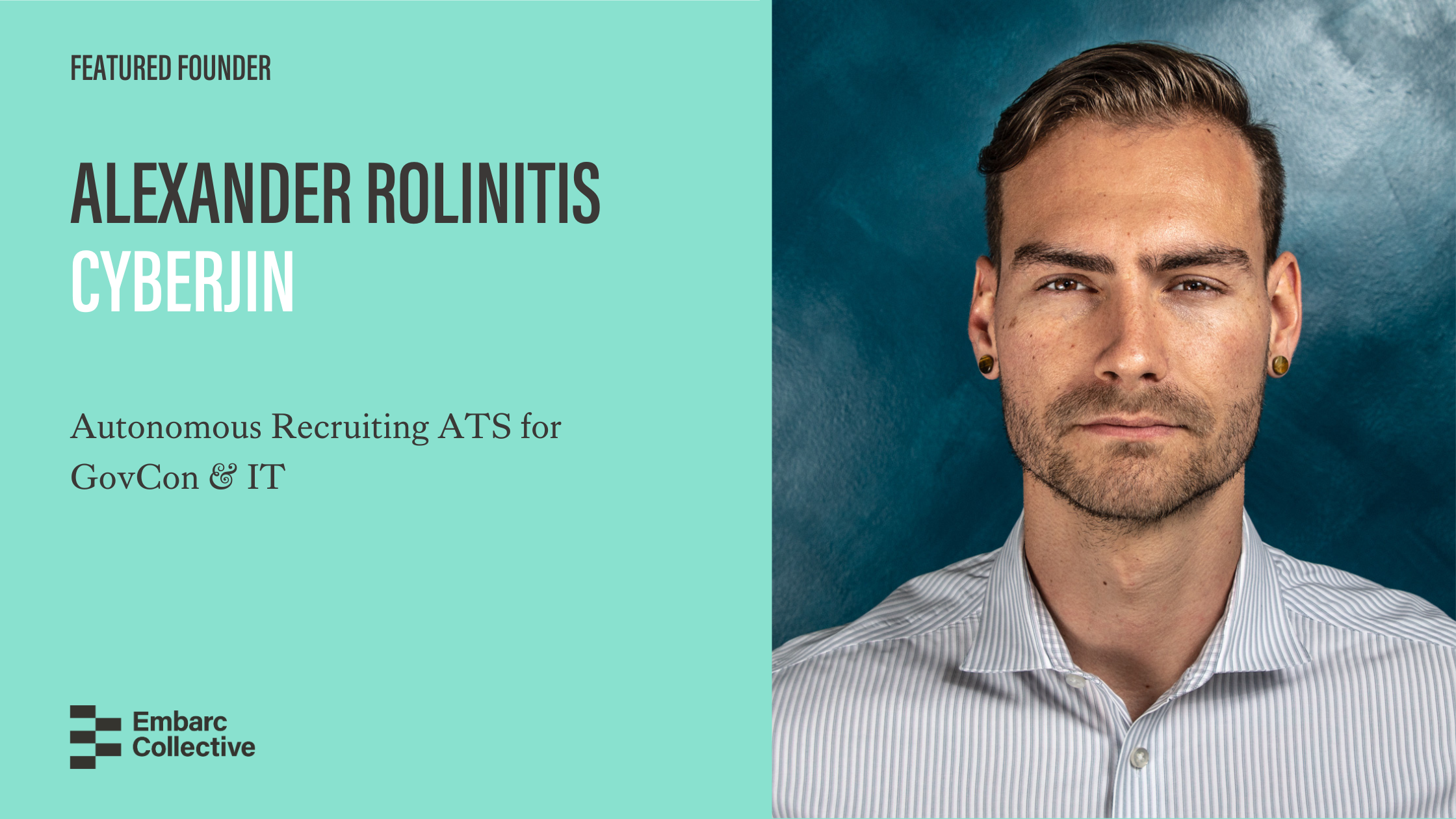
Featured Founder: Alexander Rolinitis of Cyberjin
Welcome to our Featured Founder series, where you’ll meet startup founders from Tampa-St. Petersbu...
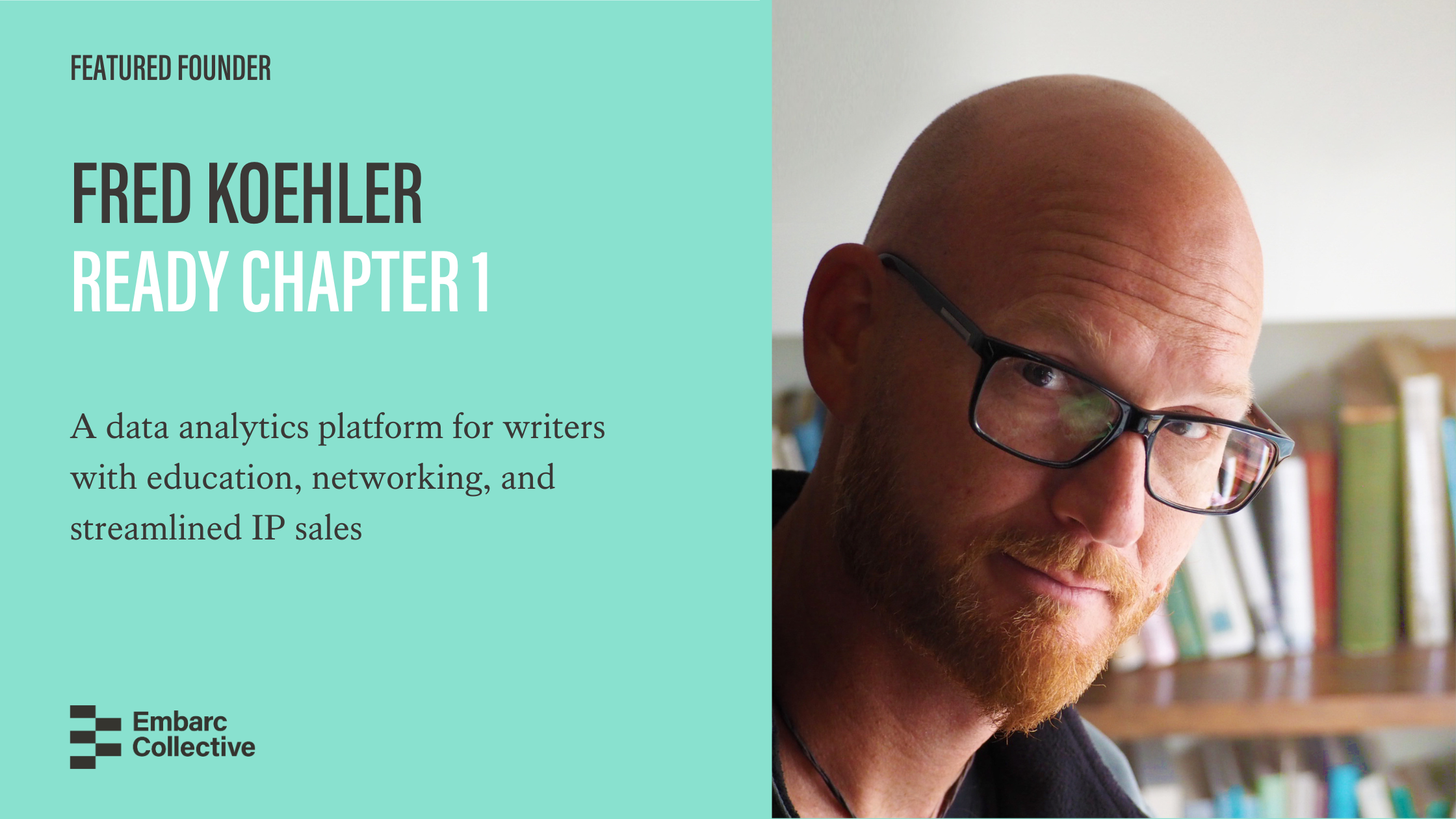
Featured Founder: Fred Koehler of Ready Chapter 1
Welcome to our Featured Founder series, where you’ll meet startup founders from Tampa-St. Petersbu...
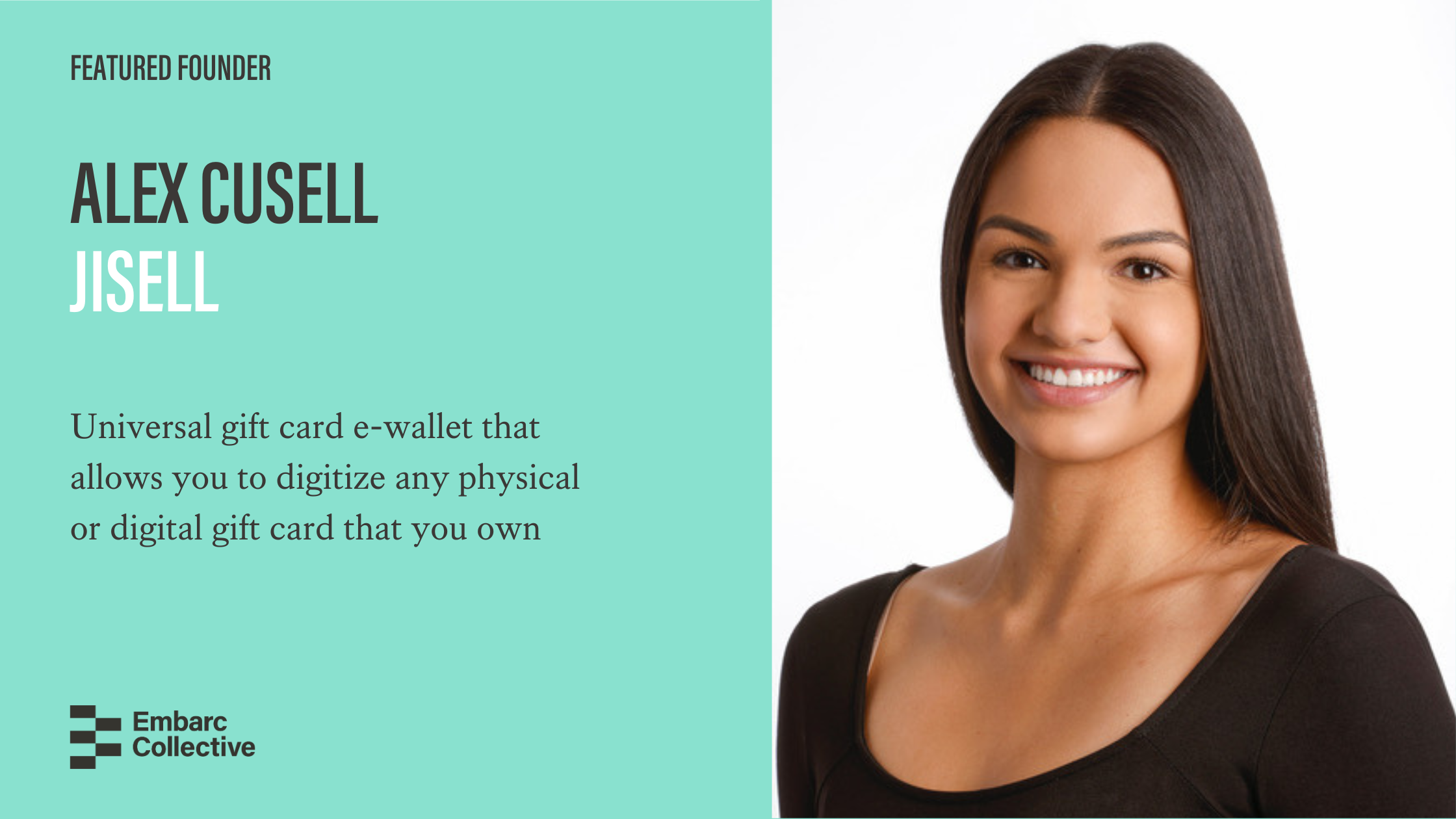
Featured Founder: Alex Cusell of Jisell
Welcome to our Featured Founder series, where you’ll meet startup founders from Tampa-St. Petersbu...
Meet Our Members
Meet the Embarc Collective member community of driven entrepreneurs who are building bold, scalable, thriving companies in Florida.